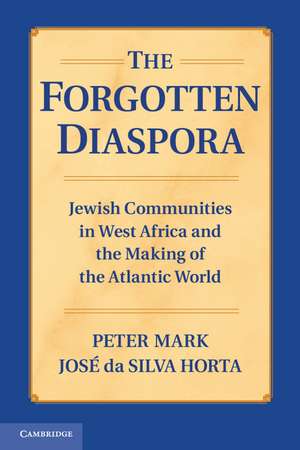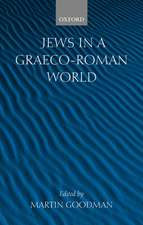The Forgotten Diaspora: Jewish Communities in West Africa and the Making of the Atlantic World
Autor Peter Mark, José da Silva Hortaen Limba Engleză Paperback – 30 iul 2013
| Toate formatele și edițiile | Preț | Express |
|---|---|---|
| Paperback (1) | 330.80 lei 6-8 săpt. | |
| Cambridge University Press – 30 iul 2013 | 330.80 lei 6-8 săpt. | |
| Hardback (1) | 693.36 lei 6-8 săpt. | |
| Cambridge University Press – 13 mar 2011 | 693.36 lei 6-8 săpt. |
Preț: 330.80 lei
Nou
Puncte Express: 496
Preț estimativ în valută:
63.31€ • 65.40$ • 52.69£
63.31€ • 65.40$ • 52.69£
Carte tipărită la comandă
Livrare economică 26 martie-09 aprilie
Preluare comenzi: 021 569.72.76
Specificații
ISBN-13: 9781107667464
ISBN-10: 1107667461
Pagini: 280
Ilustrații: 8 b/w illus. 3 maps
Dimensiuni: 152 x 229 x 16 mm
Greutate: 0.43 kg
Editura: Cambridge University Press
Colecția Cambridge University Press
Locul publicării:New York, United States
ISBN-10: 1107667461
Pagini: 280
Ilustrații: 8 b/w illus. 3 maps
Dimensiuni: 152 x 229 x 16 mm
Greutate: 0.43 kg
Editura: Cambridge University Press
Colecția Cambridge University Press
Locul publicării:New York, United States
Cuprins
Introduction; 1. Two Sephardic communities on Senegal's Petite Côte; 2. Jewish identity in Senegambia; 3. Religious interaction: Catholics, Jews, and Muslims in early 17th-century Upper Guinea; 4. The blade weapons trade in seventeenth-century West Africa; 5. The Luso-African ivories as historical source for the weapons trade and for the Jewish presence in Guinea of Cape Verde; 6. The later years: merchant mobility and the evolution of identity; Conclusion; Appendix I; Appendix II.
Recenzii
'A fascinating and richly documented study of identity negotiation among Portuguese New Christian merchants who settled in seventeenth-century Senegambia. These men married or cohabited with women from African elites, maintained contacts with the Sephardim of Amsterdam, traded across multiple boundaries (behaving when necessary as Catholics), and lived openly as Jews.' Miriam Bodian, University of Texas, Austin
'In this richly textured study, Mark and Horta show how a forgotten diaspora of Sephardic Jews from Lisbon connected three continents and laid the foundation for the emergence of a dynamic Atlantic world. Theirs is a history of the intimacy of Jewish-Muslim relations, the flexible nature of Jewish identity and practice in an African setting, and the ways that Judaism influenced African spirituality. This is a story that had to be told.' Walter Hawthorne, Michigan State University and author of From Africa to Brazil: Culture, Identity, and an Atlantic Slave Trade, 1600–1830
'This is a superb piece of detective work. Mark and Horta trace the history of several Jewish communities in late sixteenth- and early seventeenth-century Senegambia and use it to cast light on the history of the Jewish Diaspora, on West African commerce, and on the construction of race in the early modern world.' Martin Klein, University of Toronto
'… meticulously researched … this path-breaking book has persuasively demonstrated the importance of West African Jews for understanding the early modern Atlantic world.' Daniel J. Schroeter, Journal of African History
'In this richly textured study, Mark and Horta show how a forgotten diaspora of Sephardic Jews from Lisbon connected three continents and laid the foundation for the emergence of a dynamic Atlantic world. Theirs is a history of the intimacy of Jewish-Muslim relations, the flexible nature of Jewish identity and practice in an African setting, and the ways that Judaism influenced African spirituality. This is a story that had to be told.' Walter Hawthorne, Michigan State University and author of From Africa to Brazil: Culture, Identity, and an Atlantic Slave Trade, 1600–1830
'This is a superb piece of detective work. Mark and Horta trace the history of several Jewish communities in late sixteenth- and early seventeenth-century Senegambia and use it to cast light on the history of the Jewish Diaspora, on West African commerce, and on the construction of race in the early modern world.' Martin Klein, University of Toronto
'… meticulously researched … this path-breaking book has persuasively demonstrated the importance of West African Jews for understanding the early modern Atlantic world.' Daniel J. Schroeter, Journal of African History
Notă biografică
Descriere
This book traces the history of early seventeenth-century Portuguese Sephardic traders who settled in two communities on Senegal's Petit Côte.








